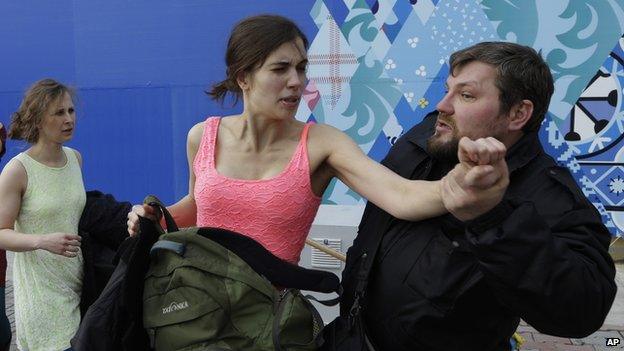Russian Orthodox Church lends weight to Putin patriotism
- Published
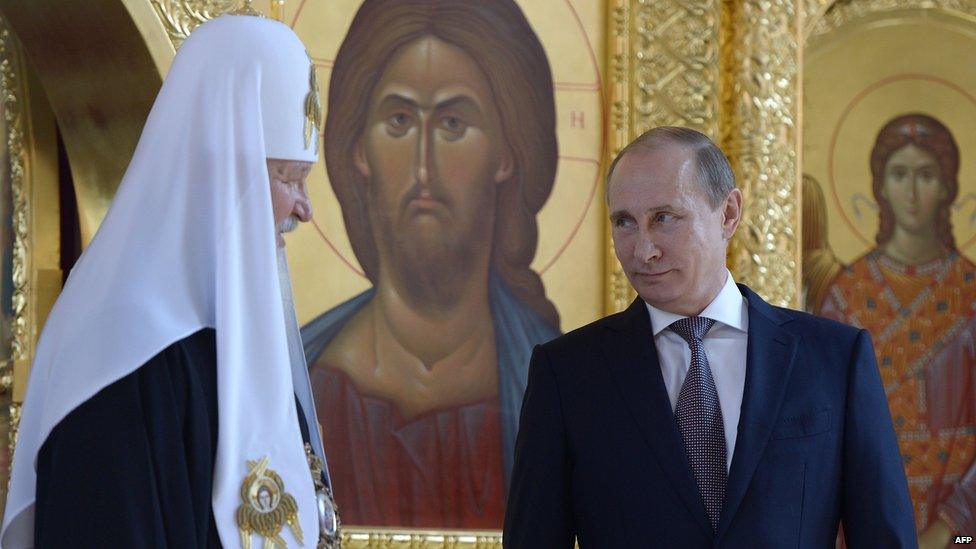
Russian TV viewers are well used to seeing President Putin (right) at Orthodox Church ceremonies
A raid by Russian Orthodox vigilantes on "blasphemous" artworks in central Moscow has highlighted the influence of traditional, ultra-conservative values in President Vladimir Putin's Russia.
The Orthodox Church has long had close links to the Kremlin. And during Russia's stand-off with the West over Ukraine that relationship has only grown stronger.
On 14 August a radical group called God's Will raided an exhibition of Soviet-era underground art at the Manezh hall, near the Kremlin.
They especially objected to avant-garde depictions of Jesus Christ and Orthodox saints - a video, external posted online showed them throwing exhibits onto the floor and shouting "You can't offend Christ like that!"
Some compared that with the destruction of ancient statues by Islamist militants, but some also accused the government of deliberately creating an atmosphere of impunity for Orthodox extremists such as God's Will leader Dmitry Enteo.
"Unless the state immediately isolates him, this will mean either that the state itself is criminal and shares his criminal beliefs, or that there is no state any more," wrote independent journalist Viktor Shenderovich.
The head of Russia's world-famous Hermitage Museum, Mikhail Piotrovsky, deplored the attack, saying "our society is sick"., external
Dmitry Enteo was released after questioning.
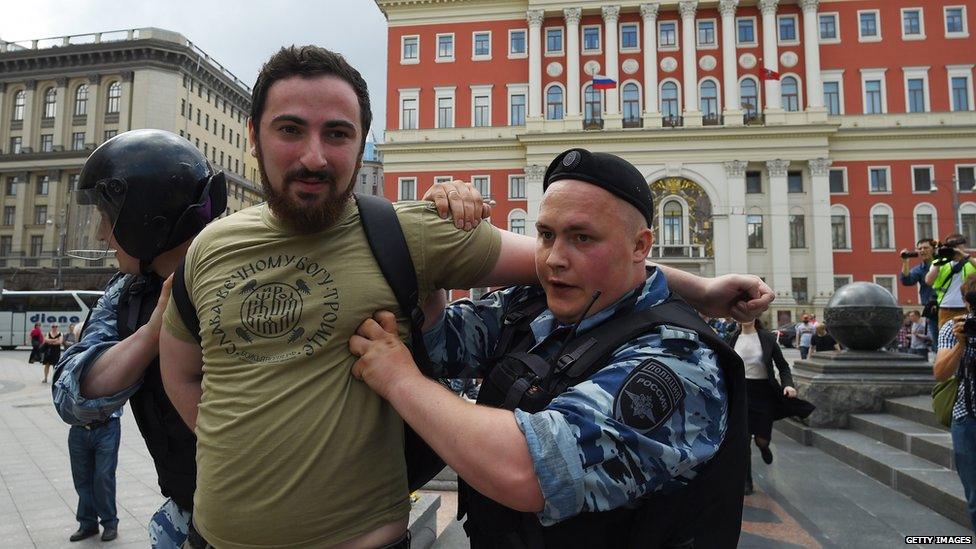
Dmitry Enteo was detained at a rally against gay rights in May 2015
In 2012 the Kremlin and the Orthodox Church jointly condemned the punk band Pussy Riot for their "punk prayer" inside Moscow's main Orthodox cathedral, in which they crudely mocked Church support for Mr Putin. Three of the participants were each sentenced to two years in jail.
Many other groups in Russia have joined the conservative chorus led by government and Church figures. Some of the most vocal are affiliated with the traditional Cossack movement.
In 2014, a group of Cossacks whipped Pussy Riot members as they were about to perform another song critical of Mr Putin.
Hundreds of Cossack militants from Russia are also fighting for the rebels against Ukrainian government troops and volunteers in eastern Ukraine.
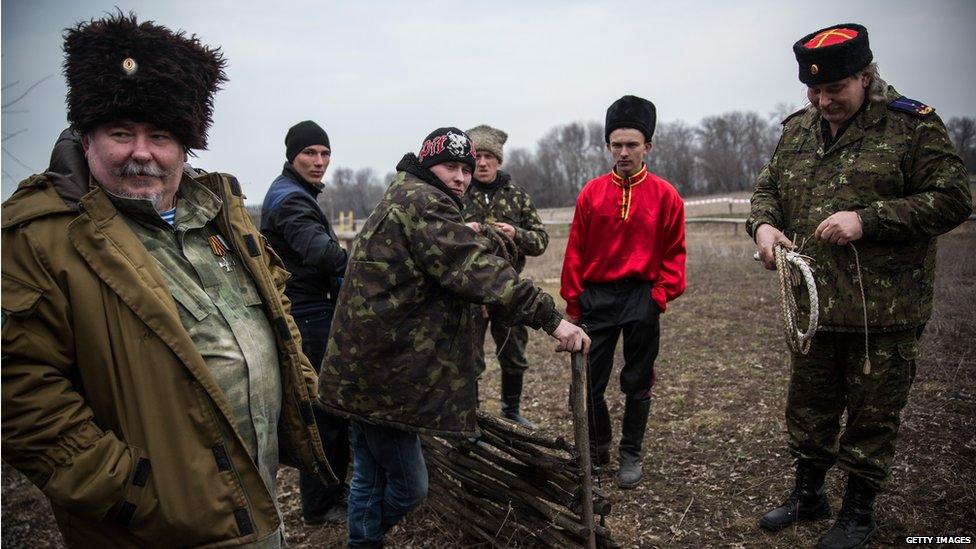
Cossacks have been fighting alongside pro-Russian separatists in eastern Ukraine
'One people'
Since the start of the war in Ukraine, in March 2014, the Orthodox Church has played a key role in the Russian propaganda campaign.
Orthodox rhetoric is now widely used by TV commentators and state officials. One such idea - "the Russian world" - originally denoted the community of Russian speakers worldwide, but has now become a buzzword justifying Russia's policy towards Ukraine.
People are being killed in Ukraine for considering themselves "part of the Russian world", Russian MP Leonid Kalashnikov said in a typical comment.
And on a controversial visit to Russian-annexed Crimea, on 17 August, Mr Putin said: "I consider Russians and Ukrainians generally to be one people".
The Russian Orthodox Church's representative in Ukraine is Metropolitan Onufriy. His official title is head of the Ukrainian Orthodox Church of the Moscow Patriarchate.
Since his enthronement in August 2014, Metropolitan Onufriy has been critical of the Kiev government's campaign against the separatists, rejecting Ukraine's European aspirations as a "tragedy".
Onufriy refused to stand up when the parliament in Kiev honoured Ukrainian fighters involved in the conflict - prompting the Kiev-based daily Den, external to say that "he is more afraid of Putin than God".
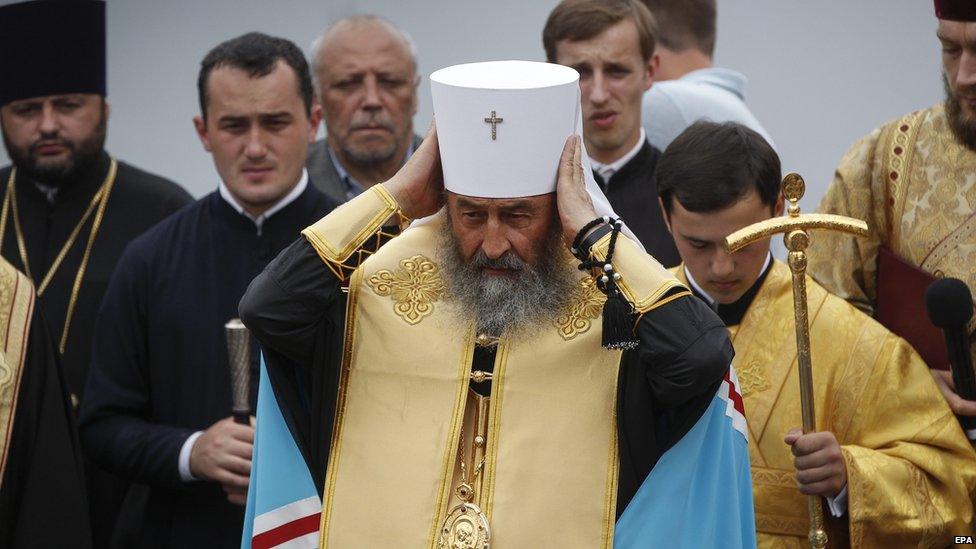
Metropolitan Onufriy has expressed pro-Russian views - touching a raw nerve in troubled Ukraine
This convergence of views between the Russian Orthodox Church and the Kremlin comes despite a constitutional provision that is supposed to keep them apart.
Since Vladimir Putin's return to power in 2012, the Church has become visible in practically all spheres of public life in Russia, from charity drives to science and the army. Pictures of Orthodox priests blessing new weapons and even space rockets have drawn much criticism from online commentators.
Alexander Yakovlev, a top Communist Party ideologue and functionary for many decades, said that the KGB "directly ran" the Orthodox Church and controlled all religious activity in the USSR. Many believe that the KGB's successor, the Federal Security Service (FSB), still has close links to top clerics.
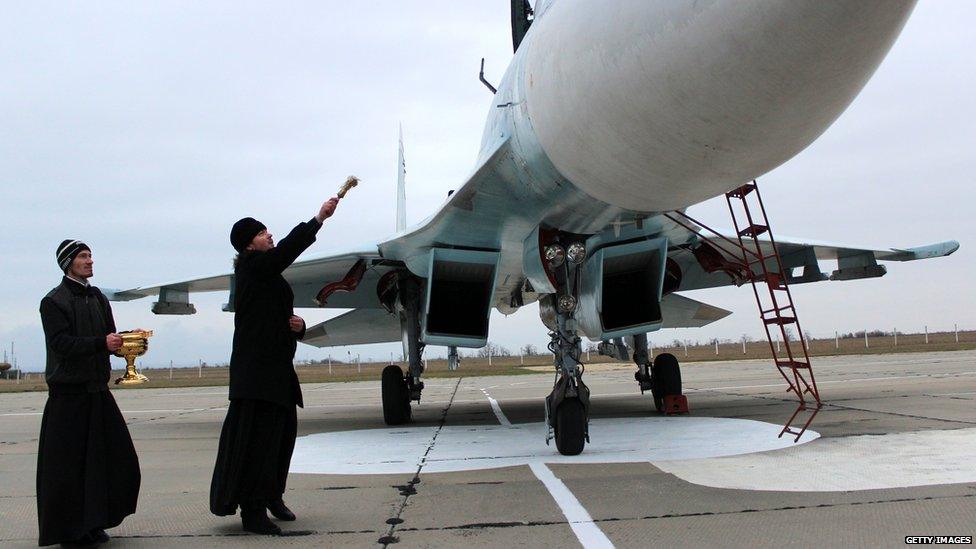
A Russian Orthodox priest blesses a fighter jet
According to Alexander Dugin, a prominent Russian ideologue banned in Ukraine, Russia's role is to advocate conservatism as a weapon against the West's "ultra-liberal values" such as same-sex marriage.
The clash of Western and traditional values goes back a long way in Russia. In the 19th Century, "Westernisers" argued bitterly with "Slavophiles" over Russia's future.
And for most of the 20th Century, the Soviet Communist Party posed as the people's defender against the West's "corrupting influence".
A rare avant-garde art exhibition was allowed in 1962, but it was quickly shut down after a visit by Soviet leader Nikita Khrushchev. "The Soviet people do not need all this," was his verdict.
More than 50 years later, the same artistic venue, Manezh, was raided by Dmitry Enteo and his God's Will followers. They also decided that Russians had no need for such art.
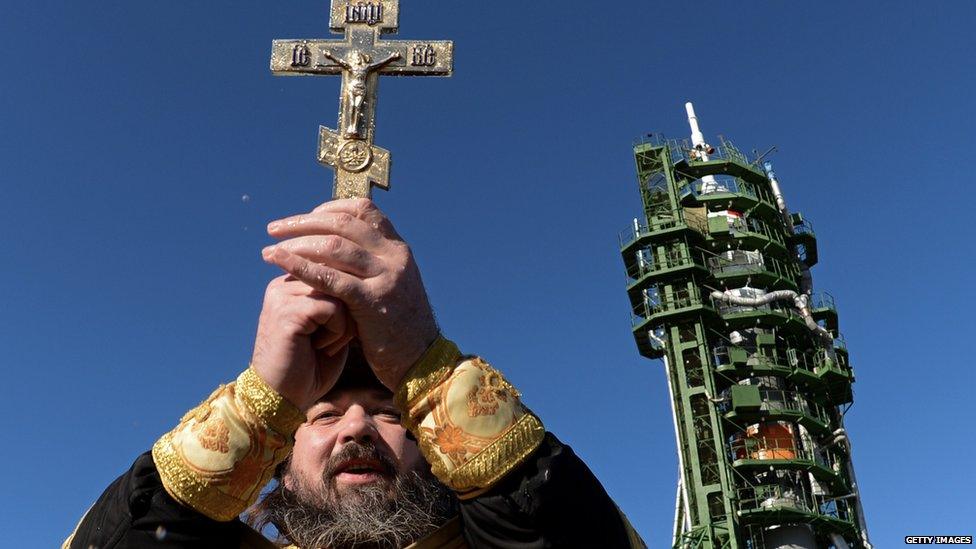
A Russian Orthodox priest conducts a ceremony near a Soyuz spacecraft before launch
(Olga Bugorkova, Yaroslava Kiryukhina and Natasha Matyukhina contributed to this article)
BBC Monitoring, external reports and analyses news from TV, radio, web and print media around the world. You can follow BBC Monitoring on Twitter , externaland Facebook, external.
- Published20 August 2015
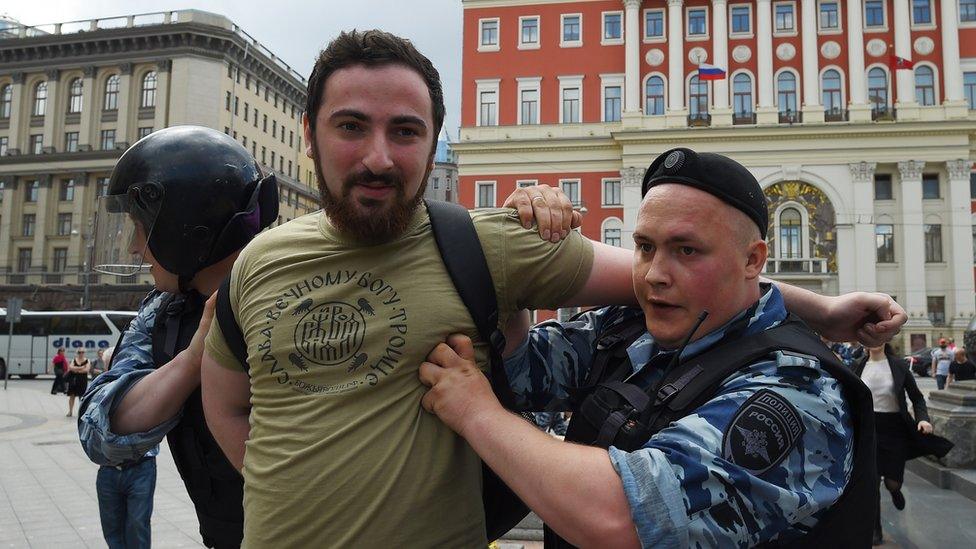
- Published28 July 2015
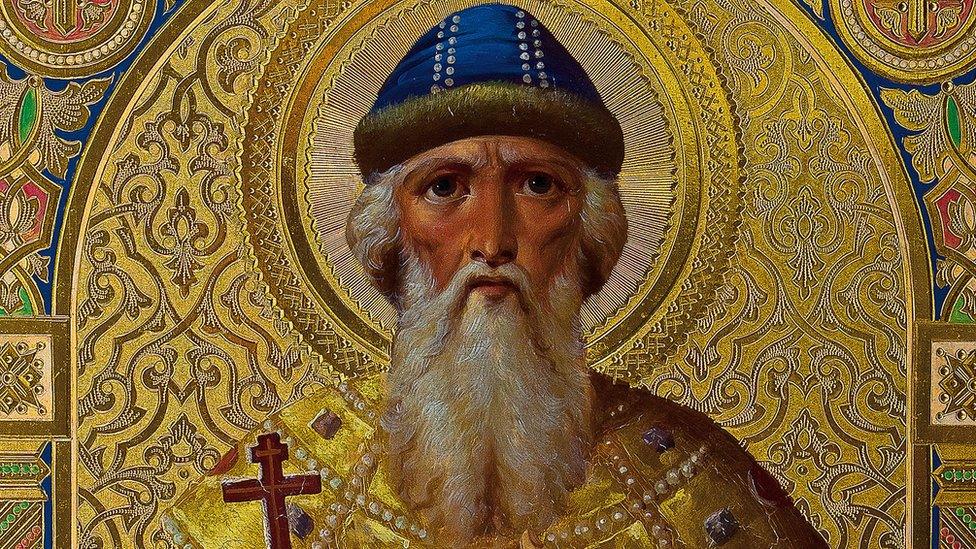
- Published2 July 2015
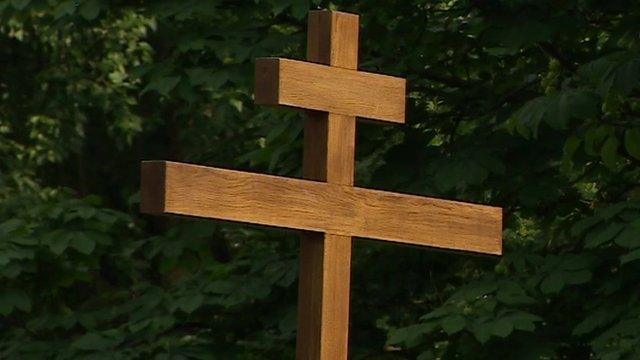
- Published10 July 2014
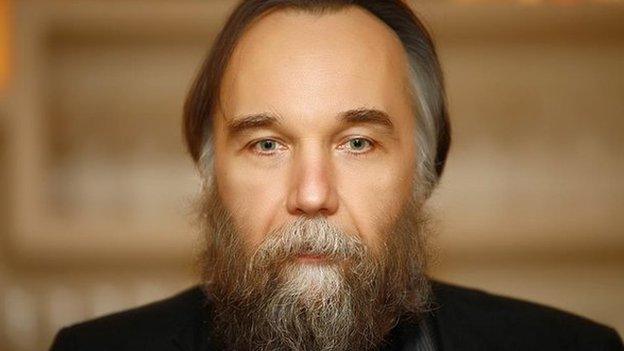
- Published19 February 2014
